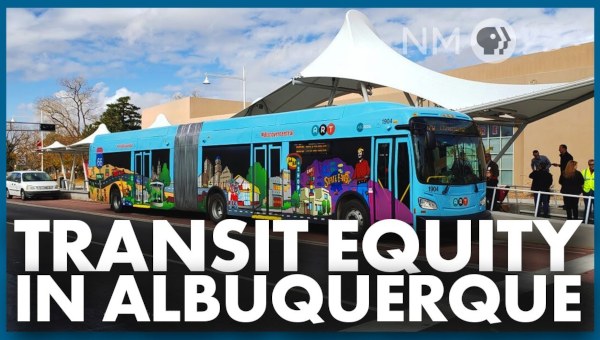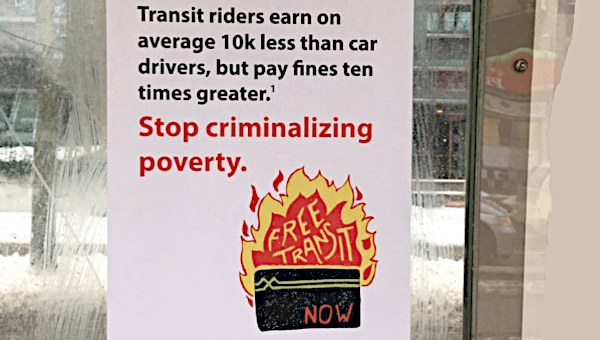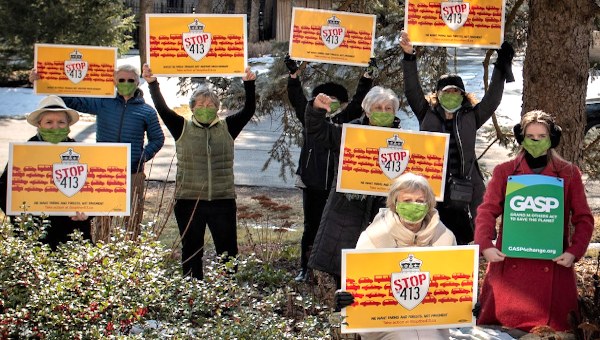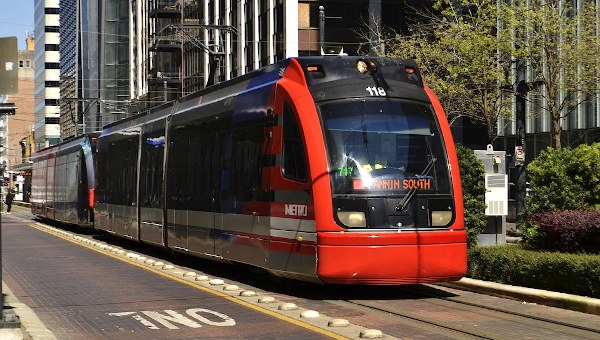Massively Expand Public Transport Now
During the San Francisco Global Climate Action Summit, the International Transport Workers’ Federation (ITF) announced its support for a declaration to create zero-emissions cities by 2030.
According to the ITF’s General Secretary Stephen Cotton, “The ITF and its affiliates are ready to support the declaration in real and tangible ways. We recognise that if we act now and act together, dangerous climate change can be averted. That’s why the ITF is here at GCAS making the case for massively expanding public transport now.”
The ITF is a global union federation representing over 20 million transport workers in 145 countries. The announcement was made in the context of the Global Climate Action Summit, in San Francisco, USA. The statement is in support of the Green and Healthy Streets Declaration by the C40 cities, which was announced in Paris in October 2017.
Green and Healthy Streets:
Transitioning to Zero Emission Transport
As a global union federation representing over 20 million transport workers in 145 countries worldwide, the ITF is proud to be leading a programme for Our Public Transport. We recognise that if we act NOW, there is still a chance of stopping dangerous climate change. Expanding public transport is an essential part of the fight to bring down greenhouse gas emissions and address climate change. Bold policies are needed, adapted to specific national and city contexts.
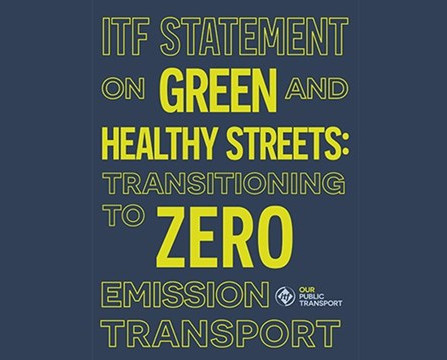 The ITF supports the C40 Cities ‘Green & Healthy Streets (Fossil-Fuel-Free Streets) Declaration’ and the commitment by mayors of pioneering cities around the world to procure, with partners, zero emission buses by 2025 and ensure that major areas of cities are zero emissions by 2030. These are bold commitments, which we congratulate, acknowledging that the most effective way to implement them is through a process of just transition involving job creation, decent work and quality jobs, and social security schemes which safeguard people’s livelihoods and social and human rights.
The ITF supports the C40 Cities ‘Green & Healthy Streets (Fossil-Fuel-Free Streets) Declaration’ and the commitment by mayors of pioneering cities around the world to procure, with partners, zero emission buses by 2025 and ensure that major areas of cities are zero emissions by 2030. These are bold commitments, which we congratulate, acknowledging that the most effective way to implement them is through a process of just transition involving job creation, decent work and quality jobs, and social security schemes which safeguard people’s livelihoods and social and human rights.
The ITF recognises that public transport needs to become more energy efficient and with lower emissions. When the principle of electrification is applied with the decarbonisation of the electricity supply, big gains in emissions reductions will be achieved. As a labour movement, we support policies which will result in improvements to the daily lives of low income and marginalized communities. Working class urban neighborhoods are often close to high traffic and industrial areas. Dirty air in cities, and the health problems which come with it, disproportionately affect these neighborhoods and the people who live in them. Public transport workers themselves are exposed to high levels of risk from air pollution as a result of long-term occupational exposure.
Achieving zero emissions in cities is only possible with an immediate and ambitious expansion of affordable, abundant, safe and reliable public transport globally.
Building the public transport systems of the future can create millions of quality jobs throughout the value chain of infrastructure and transport. It can also bring previously marginalized groups into the world of work and provide more secure and skilled employment. C40’s Green & Healthy Streets Declaration may have positive wider impacts as gender equity can be promoted by attracting and retaining women, and challenging occupational segregation in the sector. Procurement for public transport has the potential to incorporate decent work standards as well as training and apprenticeships for women, youth, and marginalized communities.
In most of the world’s cities, there is a growing spatial mismatch between where work is available, and where poor and working class people live. Affordable, abundant, safe and reliable public transport is a critical and effective poverty reduction measure, enabling poor and working class people to access paid and better quality employment.
In order to realise these objectives, the ITF and its affiliates are ready to play a role in supporting C40’s Green & Healthy Streets Declaration by:
- Working in partnerships with mayors and cities to ensure that the transition to fossil-fuel-free streets is a just transition that creates decent jobs, reduces inequality, and drives inclusion and improvements in the lives of working class and low income people.
- Building partnerships with mayors and city authorities to develop and integrate just transition plans that drive decent work and social action, including labour impact assessments, safeguards and job targets for men and women workers.
- Mobilising workers knowledge and skills to shape and enhance the supportive actions needed to meet the commitments in the Declaration.
- Working in partnerships with mayors and city authorities to deliver a just transition to zero emission buses, including developing plans for relevant worker training.
Download PDF version.
Our Public Transport
Public transport affects everyone. It is an integral and essential part of the modern world.
Yet not everyone has a say in how it is run, and for whose benefit. Too often public transport planning does not include the views of the real experts – workers and passengers.
The ITF’s Our Public Transport programme aims to redress this. It is actively campaigning for public transport based on public ownership, public investment, secure jobs and union rights for workers in public and private employers.
How are we doing this? See our campaigns, stories, resources and videos on this page.
Get in touch with the ITF Our Public Transport team: opt@itf.org.uk


